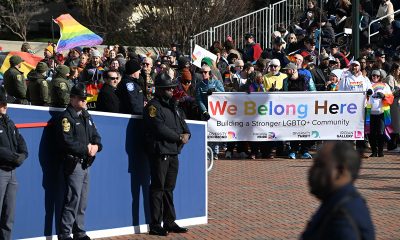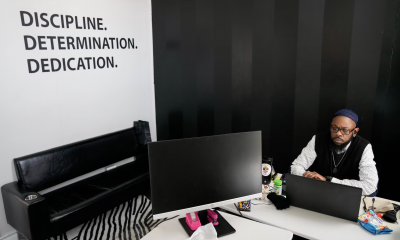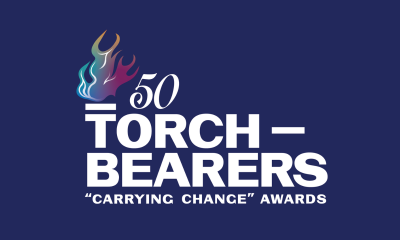a&e features
‘Messiah,’ ‘Nutcracker’ and gay fare among D.C.-area’s 2018 holiday shows
Gay Men’s Chorus, John Waters, several versions of ‘A Christmas Carol’ and more slated
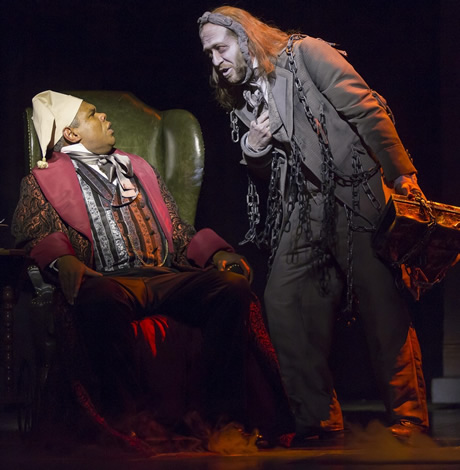
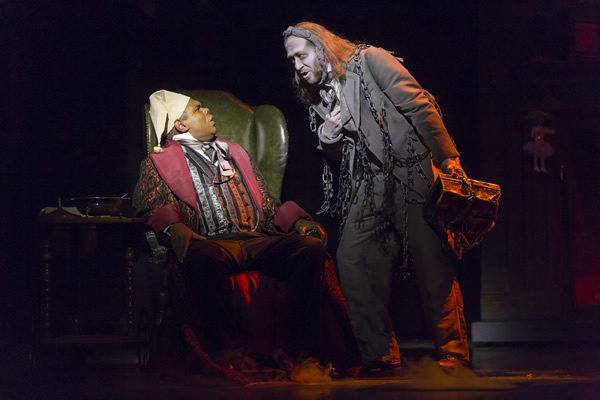
Craig Wallace as Scrooge and James Konicek as Marley in Ford Theatre’s ‘A Christmas Carol.’ (Photo by Scott Suchman; courtesy Ford’s)
Let the festivities begin! From drag queens to Queen Elizabeth I, there are fabulous holiday celebrations happening throughout the D.C. metro area this year.
“A Drag Queen Christmas: The Naughty Tour” comes to the Warner Theatre on Sunday, Nov. 18. Featuring contestants from “RuPaul’s Drag Race,” the evening includes holiday songs and fierce drag performances from the catwalk. Details can be found at warnertheatredc.com.
As part of the Smithsonian Ingenuity Festival (smithsonianmag.com/ingenuity), singer-songwriter Jewel will present her “Handmade Holiday Tour”at the Lincoln Theatre on Tuesday, Dec. 6.
The Lincoln Theatre will also host “The Holiday Show” by the Gay Men’s Chorus of Washington (gmcw.org/season-shows/the-holiday-show). Their annual holiday extravaganza returns with an all-new show, featuring dancing elves, falling snowflakes, soaring vocals and a special visit from Santa Claus. Performances run from Dec. 8-16 and some performances will include ASL interpretation.
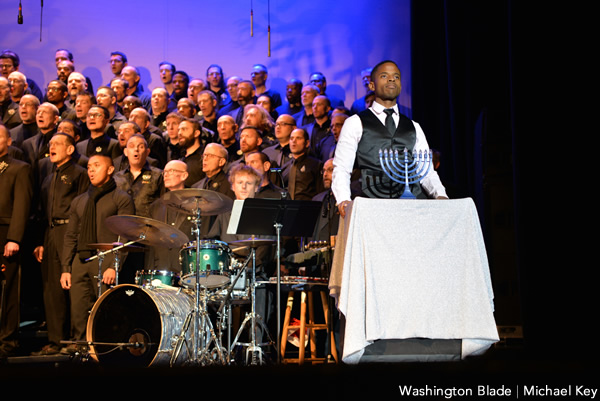
The Gay Men’s Chorus of Washington’s holiday show last year. (Washington Blade file photo by Michael Key)
From Dec. 14-23, the Folger Consort (folger.edu/folger-consort), the early music ensemble in residence at the Folger Shakespeare Library will present 12 concerts of “A Christmas Messe: A Banquet of Seasonal English Music.” In addition to seasonal English music from the 14th-17th centuries, celebrated D.C. actor Rick Foucheux will read scenes from a 1619 Christmas comedy.
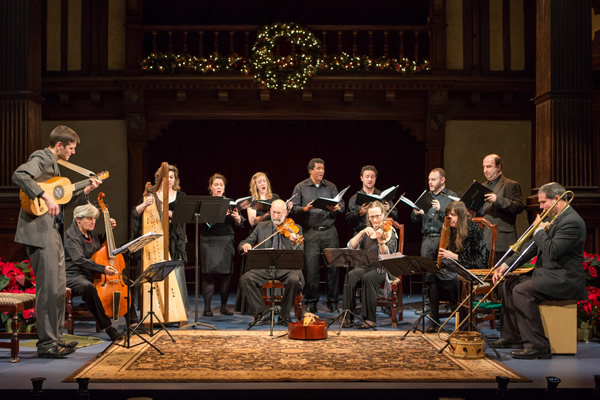
The Folger Consort in concert. (Photo by Teresa Wood; courtesy Folger Shakespeare Library)
The Folger Shakespeare Library (folger.edu) will also celebrate the season with the annual Emily Dickinson Birthday Tribute. On Monday, Dec. 10, there will be a discussion of Dickinson’s poetry followed by a wine reception featuring slices of Dickinson’s famous black cake.
Since 1983, the Washington Revels have held its annual “Christmas Revels” to celebrate the winter solstice and the “return of the sun.” Presided over by Queen Elizabeth I (Katrina Van Duyn), this year’s festivities will include performances by mummers and “rude mechanicals,” Morris dancing from the all-female Rock Creek Morris Women, performances of children’s singing games and dancing in the aisles for everyone. Performances run Dec. 8-16 at GW’s Lisner Auditorium. Details at revelsdc.org.
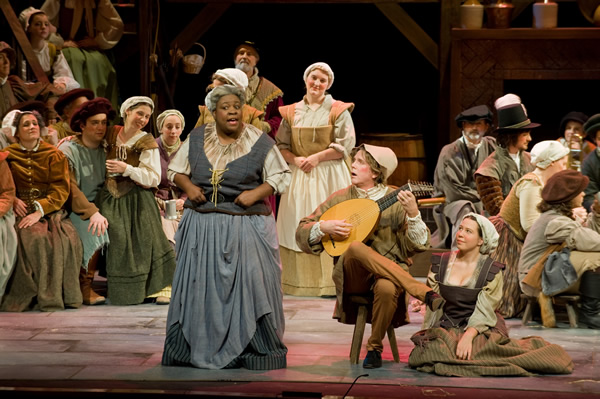
A scene from last year’s Christmas Revels show. (Photo courtesy Revels)
D.C. Different Drummers (dcdd.org) will hold their annual holiday concert on Sunday, Dec. 9 at the Church of the Redemption near Union Station.
On Dec. 1-2, the Smithsonian Holiday Film Festival will take place at the Smithsonian’s Warner Bros. Theatre. Screenings will include “A Christmas Story,” “It’s A Wonderful Life,” “Meet Me in St. Louis,” “Elf” and “Wonder Woman.” More information can be found at si.edu/theaters/holiday-film-festival.
Charles Dickens will of course be making his annual holiday appearance. For a maximalist approach to “A Christmas Carol,” head to Ford’s Theatre (fords.org) where award-winning D.C. actor Craig Wallace leads a large cast in a splendid retelling of the timeless tale.
From Dec. 15-31, the Keegan Theatre (keegantheatre.com) offers a non-traditional adaptation of the classic tale for the adults in the family. Set in modern Dublin, Matthew Keenan’s “An Irish Carol” is about a prosperous pub owner who is forced to reevaluate his life on Christmas Eve.
For a minimalist approach to the Yuletide classic, head to the Olney Theatre (olneytheatre.org) where company member Paul Morella will present his annual solo rendition of “A Christmas Carol: A Ghost Story of Christmas.”
Olney Theatre will also present the musical “Elf the Musical” through Jan. 6. Based on the hit Will Ferrell movie, the warm-hearted family musical tells the story of Buddy, a human accidentally transported to the North Pole as a baby.
In a somewhat jazzier mode, Arena Stage is offering gay composer Cole Porter’s effervescent musical “Anything Goes” this holiday season. Directed by Molly Smith and choreographed by Parker Esse, the madcap musical includes such classics as “Blow, Gabriel Blow,” “You’re the Top,” “I Get a Kick out of You” and the exhilarating title number.
Dragons (and imaginations) soar in Synetic Theatre’s wordless Family Theatre production of “My Father’s Dragon.” Based on the book by Ruth Stiles Gannett, the story centers on a young child and his cat companion as they try to rescue a captive baby dragon (synetictheater.org).
The staff at Wolf Trap says that “the best way to spread holiday cheer is singing loud for all to hear.” Attendees at the “Annual Holiday Sing-A-Long”are invited to bring a new, unwrapped toy for Toys for Tots and a candle to participate in the traditional candlelit recessional during the last verse of “Silent Night” Admission is free and details can be found at wolftrap.org/tickets.
From Dec. 14-30, the Atlas Performing Arts Centre on H Street, NE (atlasarts.secure.force.com/ticket) will present Step Afrika!’s Magical Musical Holiday Step Show. This contemporary holiday tradition features percussive beats, friendly, furry characters, pre-show instrument-making workshops and a dance party hosted by DJ Frosty the Snowman.
From free shows on the Millennium Stage to a diverse array of concerts and shows in several theaters, every corner of the Kennedy Center will be filled with holiday cheer this season. This year’s schedule includes “Love, Factually,” the Second City’s farcical take on the beloved holiday film (Dec. 4-31); NSO Pop’s “A Holiday Pops! Under the Mistletoe with special guest Ashley Brown (who played Mary Poppins on Broadway) (Dec. 14-14); and “The Nutcracker” performed by Utah’s Ballet West (Dec. 5-9).
From Dec. 14-16, the Kennedy Center will also host the Washington National Opera’s annual Family Holiday Opera “The Lion, the Unicorn and Me” based on the book by lesbian author Jeanette Winterson and directed by Francesca Zambello, the out artistic director of the WNO. From Dec. 20-23, the National Symphony Orchestra will present the perennial audience favorite Handel’s “Messiah.” The popular “Sing-Along Messiah” will take place Dec. 23. Free general admission tickets will be distributed starting at 4:30 p.m. the day of the event.
For a full list of holiday events at the Kennedy Center, go to kennedy-center.org.
Fans of “The Nutcracker” can also see the beloved holiday ballet at other venues throughout the area. The Washington Ballet will present “Septime Weber’s The Nutcracker” at THEARC Theatre Nov. 24-25 and at the Warner Theatre Nov. 29-Dec. 28. Set in Georgetown in 1882, the cast includes George Washington, King George III and other historical characters. More information on the 15th anniversary production can be found at washingtonballet.org.
The Strathmore in Bethesda, Md., is presenting two versions of “The Nutcracker.” Featuring authentic Russian costumes and hand-painted sets, the “Moscow Ballet’s Great Russian Nutcracker” (Dec. 16-17) returns the dance to its European roots. With digital scenery and an on-stage DJ, “The Hip Hop Nutcracker” (Dec. 18-19) offers a contemporary take on the classic tale. For other holiday programming at the Strathmore, head to strathmore.org.
Seasonal programming at the legendary Birchmere in Alexandria, Va., (birchmere.com) includes concerts by Melissa Etheridge (Nov. 26-28), Sara Evans (Dec. 8), Judy Collins (Dec. 18-19), John Waters (Dec. 20) and Maysa (Dec. 22).
With beautiful holiday decorations augmenting the legendary stained-glass windows, the Washington National Cathedral (cathedral.org) is a splendid place to celebrate the holiday season. On Dec. 7-9, the Cathedral Choir will sing Handel’s “Messiah,” and on Dec. 8, the chorus will present a special family edition of the “Messiah.” This shortened version of this iconic work focuses on the birth of Jesus and continues the story of his death and resurrection through selected arias and choruses, ending with the famous “Hallelujah Chorus.”
Dance Place in the Brookland neighborhood (danceplace.org) will hold a Kwanzaa Celebration Dec. 15-16. Led by director Sylvia Soumah, the communal event will celebrate the seven principles of the holiday.
On Dec. 28, the Smithsonian’s Anacostia Community Museum (anacostia.si.edu) will host an interactive introduction to Kwanzaa with Baba Ras D and the LeSole Dance Project. The audience participatory program includes dancers, singers, music, colorful costumes and lively characters designed for young children and adults alike.
If you’re gorged out on holiday fare and want something different, The Washington Stage Guild presents the world premiere of “All Save One” by local playwright Greg Jones Ellis Nov. 15-Dec. 9. Set in 1950s Hollywood, it’s a witty dramedy that depicts what goes on behind closed doors when a world-famous writer, his actress wife and longtime “secretary” arrive in England only to have their comfortable household disrupted by the arrival of a handsome young priest and a film producer. It’s at The Undercroft Theatre of Mount Vernon Place United Methodist Church (900 Massachusetts Ave., N.W.). E-mail [email protected] for details.
a&e features
Visible and unapologetic: MAL brings the kink this weekend
Busy lineup includes dances, pups, super heroes, and more
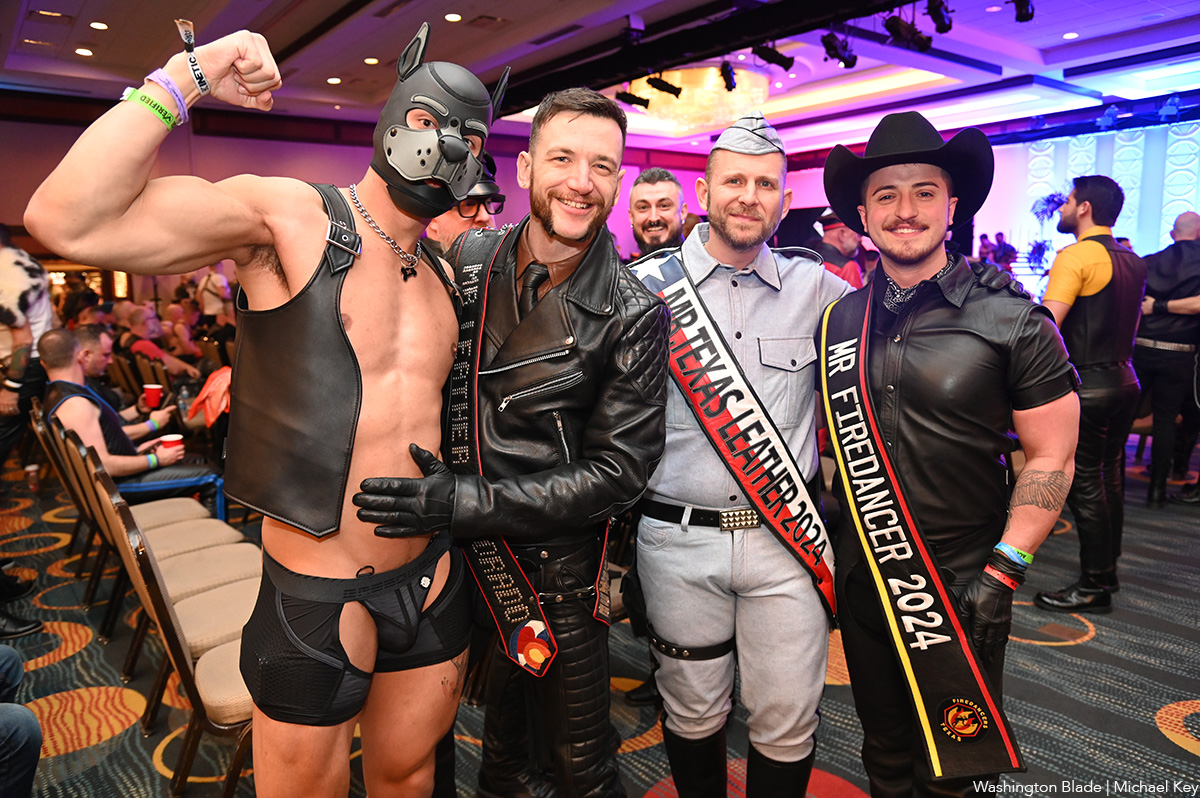
MLK Weekend in D.C. brings the annual Mid-Atlantic Leather (MAL) Weekend. Just a short walk from where Congress has been attacking queer Americans this year, MAL takes place at the Hyatt Regency Washington for several days of intrigue, excitement, leather, and kink.
The Centaur Motorcycle Club — one of several similar groups dedicated to leather in the country — has been hosting MAL in its current form for more than 40 years. Originally a small gathering of like-minded people interested in the leather lifestyle, MAL has grown to include a full four days of events, taking place onsite at the Hyatt Regency Washington (400 New Jersey Ave., N.W.). Select partner happenings take place each night, and many more non-affiliated events are scattered across the DMV in honor of and inspired by MAL.
MAL Weekend has become an internationally renowned event that celebrates fetish culture, yet it also raises funds for LGBTQ organizations, “reinforcing its legacy as both a cultural and philanthropic cornerstone of the global leather community,” according to MAL organizers.
During the day, MAL events at the Hyatt include workshops, social gatherings, shopping, and other in-person engagements for the community.
“The Hyatt underwent an extensive top to bottom renovation after last year’s event,” says Jeffrey LeGrand-Douglass, the event chair. The lobby, meeting spaces, guest rooms, and other areas have been updated, he notes, “so I am very excited for our guests to experience the new design and layout for the first time. And of course as with every year, we look forward to the contest on Sunday afternoon and seeing who will become our new Mr. MAL.”
In the evening, MAL hands the reins to partner KINETIC Presents, the D.C.-based nightlife production company. KINETIC will host four consecutive nights of high-production events that fuse cutting-edge music, immersive environments, and performance. This year, KINETIC is popping open doors to new-to-MAL venues, international collabs, play zones, and a diverse lineup.
According to KINETIC managing partner Zach Renovátes, 2026 is the most extensive MAL production to date. “The talent lineup is unreal: an all-star roster of international DJs, plus drag superstar performances at the Saturday main event,” he says.
Renovátes added that he’s “most excited about the collaborations happening all weekend — from bringing in MACHO from WE Party Madrid, to teaming up with local leather groups, to nonprofit partners, and Masc Diva [a queer nightlife collective].”
Official MAL events begin on Thursday with the Full Package/Three Day Pass Pick-Up from 5:30-8:30 p.m. at the Hyatt.
Thursday night is also the KINETIC kickoff party, called LUST. Running 10 p.m. – 3 a.m., it’s being held at District Eagle. DJ Jay Garcia holds it down on the first floor, while DJ Mitch Ferrino spins in the expansive upstairs. LUST features special performances from the performers including Serg Shepard, Arrow, Chase, and Masterpiece.
Renovátes notes that the LUST opening party at District Eagle coincides with the bar’s grand re-opening weekend. The bar will unveil its new permanent home on the renovated second floor. “it felt like the perfect place to start Mid-Atlantic Leather weekend — right in D.C.’s only dedicated home for kink communities,” he says.
After Thursday night, Friday is when daytime events begin at the Hyatt. The Exhibit Hall, on the ballroom level below the lobby, hosts upwards of 30 vendors, exhibitors, and booths with leather goods, fetish wear, clothes, toys, other accessories, providing hours of time to shop and connect with attendees and business owners. The Exhibit Hall will be open on Friday from 4-10 p.m., as well as on Saturday and Sunday afternoons.
DC Health is once again back at MAL, to provide preventative health services. In the past, DC Health has provided MPox vaccines, Doxy PEP, HIV testing, Narcan kits, and fentanyl test strips. This booth will be open on Friday 4-10 p.m.
Later, at 6 p.m., the Centaur MC is holding its welcome reception on the ballroom floor. After the Centaur’s Welcome Reception, the MIR Rubber Social is 8-11 p.m. A Recovery Meeting is scheduled at 10 p.m.
Many attendees enjoy visiting the guest room levels of the hotel. Note that to get in an elevator up to a hotel room, a staff member will check for a hotel room wristband. Non-registered guests can only access host hotel rooms if they are escorted by a registered guest with a valid wristband. Registered guests are permitted to escort only one non-registered guest at a time. Non-registered guests with a wristband who are already in the hotel before 10 p.m. may remain until midnight. However, non-registered guests without a wristband will not be admitted after registration closes.
Friday night, for the first time, KINETIC Presents is joining forces with WE Party to bring MACHO to Washington, D.C. This official MAL Friday event delivers two stages and two genres. On the UNCUT XXL stage, international Brazilian circuit superstars Erik Vilar and Anne Louise bring their signature high-energy sound. On the MACHO stage, Madrid’s Charly is joined by Chicago’s tech-house force, Karsten Sollors, for a blend of techno and tech house. UNCUT also features the XL Play Zone, a massive, immersive space exclusive to this event. The party takes place at the Berhta space from 10 p.m.-4 a.m..
“This year we’re bringing back the two-room format we debuted at WorldPride for both Friday and Saturday, so attendees can really tailor their experience — whether they’re in the mood for circuit or tech house.” says Renovátes.
Directly after Friday’s UNCUT XXL, UNDERWORLD Afters takes over District Eagle, from 3:30-8 a.m. International DJ Eliad Cohen commands the music.
Saturday, the Exhibit Hall opens earlier, at 11 a.m.. DC Health will also be back from 11 a.m. to 6 p.m.
Saturday is also time for one of the most anticipated events, the Puppy Mosh, running from 11 a.m. to 1 p.m. During the event, pup culture comes to life, when pups, handlers, and friends can enjoy an inclusive, safe pup zone. There is also a Recovery Meeting at 11 a.m., and the IML Judges Announcement takes place at noon.
The popular Super Hero Meet Up will be held 1:30 p.m. – 3 p.m., sponsored by One Magical Weekend, for cosplayers, comic enthusiasts, and their friends.
From 2-6 p.m., the Onyx Fashion Show will take place to showcase and highlight people of color in leather.
Finally, the Leather Cocktail Party – the original event of MAL – will be held 7-9 p.m. in the Ballroom. While this requires special tickets to attend, at 9 p.m. is the MAL cocktail party, which is open to wider attendees.
The last event of Saturday leaves the hotel, again a partnership with KINETIC. Kicking off at 10 p.m. and running until 4 a.m., it’s just the second time that KINETIC’s Saturday night party is an official MAL event and serves as the main weekend engagement.
Saturday night’s centerpiece is called KINK: Double Trouble. The night will feature a first-ever back-to-back set from international electronic music icons Nina Flowers and Alex Acosta on the Circuit/Tribal Stage. The other room – the Tech House Stage – curated by The Carry Nation and Rose, provides a darker, underground counterpoint, reinforcing the event’s musical depth and edge.
Beyond the DJs, KINETIC has called in the big shots for this party: “RuPaul’s Drag Race” legends Nymphia Wind and Plastique Tiara are set to headline. The party also takes place at Berhta.
Sunday, back at the hotel, there will be another Recovery Meeting at 10 a.m., and the Exhibit Hall opens again from 11 a.m.-5 p.m.
At 1 p.m., the anticipated and prestigious Mr. MAL Contest that celebrates the achievements of the leather community will be held in the Ballroom. This highly sought after title gives one man the power to become the Mid-Atlantic Leather man of the year. Sash and title winners must be (1) male, (2), a resident of North America, (3) At least 21 years of age; and (4) self-identify as gay. The first Mr. MAL was crowned in 1985. The Winner of Mr. MAL has the privilege of later competing in International Mr. Leather (IML) in Chicago on Memorial Day Weekend 2025.
From 4 p.m. to 12 a.m., MAL will hold its Game Night for the gaymers in attendance. There will also be a special screening of A24’s new film, “Pillion,” about a man who is swept off his feet when an enigmatic, impossibly handsome biker takes him on as his submissive.
Sunday closes with a community partner event produced by Masc Diva, featuring Horse Meat Disco with support from Coach Chris, at A.I. Warehouse in the Union Market district. It’s the same team that produced HMD during WorldPride at A.I. Warehouse.
Note that there are several types of passes for attendance to the hotel and parties. KINK VIP Weekend Passes include express entry, VIP areas, and enhanced amenities throughout the weekend, while MAL Full Weekend Package holders receive access to the official Sunday closing event.
At last year’s MAL events, KINETIC Presents raised more $150,000 for LGBTQ charities, and expects to match or exceed that impact in 2026.
Renovátes stated that “now more than ever, it’s important to create safe, affirming spaces for our community — but it’s just as important to be visible and unapologetic. We want to make it clear that the LGBTQ+ and leather communities aren’t going anywhere. We’ve fought too long and too hard to ever feel like we have to shrink ourselves again, no matter what the political climate looks like.”
In addition to the KINETIC events, various LGBTQ bars will hold parties celebrating the theme of the weekend. For example, Kiki, located on U Street NW, is hosting a party called KINKI, hosted by DJ Dez, on Saturday night. Sister bar Shakiki, on 9th Street NW, is hosting a party called Railed Out, a fetish-inspired party that features a play zone, on Thursday night. Flash, on U Street NW, will hold its infamous Flashy Sunday party to close out the weekend.
a&e features
Queer highlights of the 2026 Critics Choice Awards: Aunt Gladys, that ‘Heated Rivalry’ shoutout and more
Amy Madigan’s win in the supporting actress category puts her in serious contention to win the Oscar for ‘Weapons’
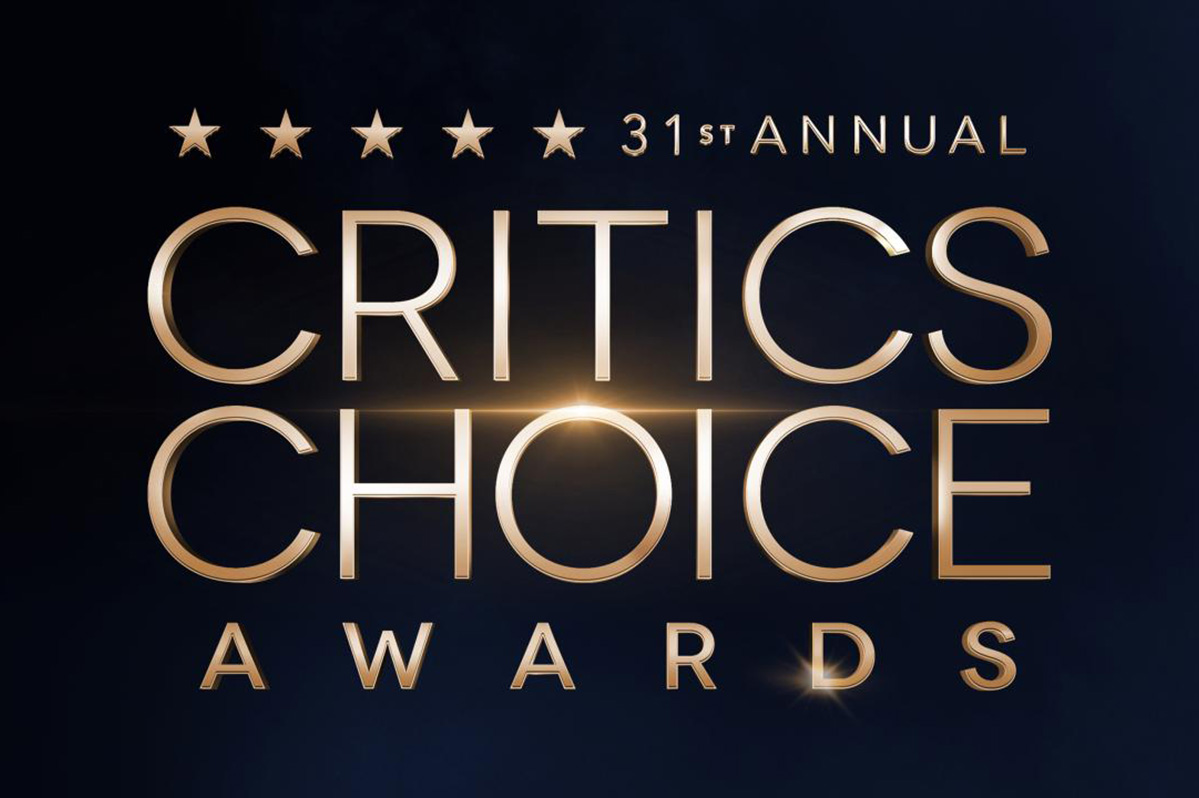
From Chelsea Handler shouting out Heated Rivalry in her opening monologue to Amy Madigan proving that horror performances can (and should) be taken seriously, the Critics Choice Awards provided plenty of iconic moments for queer movie fans to celebrate on the long road to Oscar night.
Handler kicked off the ceremony by recapping the biggest moments in pop culture last year, from Wicked: For Good to Sinners. She also made room to joke about the surprise hit TV sensation on everyone’s minds: “Shoutout to Heated Rivalry. Everyone loves it! Gay men love it, women love it, straight men who say they aren’t gay but work out at Equinox love it!”
The back-to-back wins for Jacob Elordi in Frankenstein and Amy Madigan in Weapons are notable, given the horror bias that awards voters typically have. Aunt Gladys instantly became a pop culture phenomenon within the LGBTQ+ community when Zach Cregger’s hit horror comedy released in August, but the thought that Madigan could be a serious awards contender for such a fun, out-there performance seemed improbable to most months ago. Now, considering the sheer amount of critics’ attention she’s received over the past month, there’s no denying she’s in the running for the Oscar.
“I really wasn’t expecting all of this because I thought people would like the movie, and I thought people would dig Gladys, but you love Gladys! I mean, it’s crazy,” Madigan said during her acceptance speech. “I get [sent] makeup tutorials and paintings. I even got one weird thing about how she’s a sex icon also, which I didn’t go too deep into that one.”
Over on the TV side, Rhea Seehorn won in the incredibly competitive best actress in a drama series category for her acclaimed performance as Carol in Pluribus, beating out the likes of Emmy winner Britt Lower for Severance, Carrie Coon for The White Lotus, and Bella Ramsey for The Last of Us. Pluribus, which was created by Breaking Bad’s showrunner Vince Gilligan, has been celebrated by audiences for its rich exploration of queer trauma and conversion therapy.
Jean Smart was Hack’s only win of the night, as Hannah Einbinder couldn’t repeat her Emmy victory in the supporting actress in a comedy series category against Janelle James, who nabbed a trophy for Abbott Elementary. Hacks lost the best comedy series award to The Studio, as it did at the Emmys in September. And in the limited series category, Erin Doherty repeated her Emmy success in supporting actress, joining in yet another Adolescence awards sweep.
As Oscar fans speculate on what these Critics Choice wins mean for future ceremonies, we have next week’s Golden Globes ceremony to look forward to on Jan. 11.
a&e features
Looking back at the 10 biggest A&E stories of 2025
‘Wicked,’ Lady Gaga’s new era, ‘Sexy’ Bailey and more
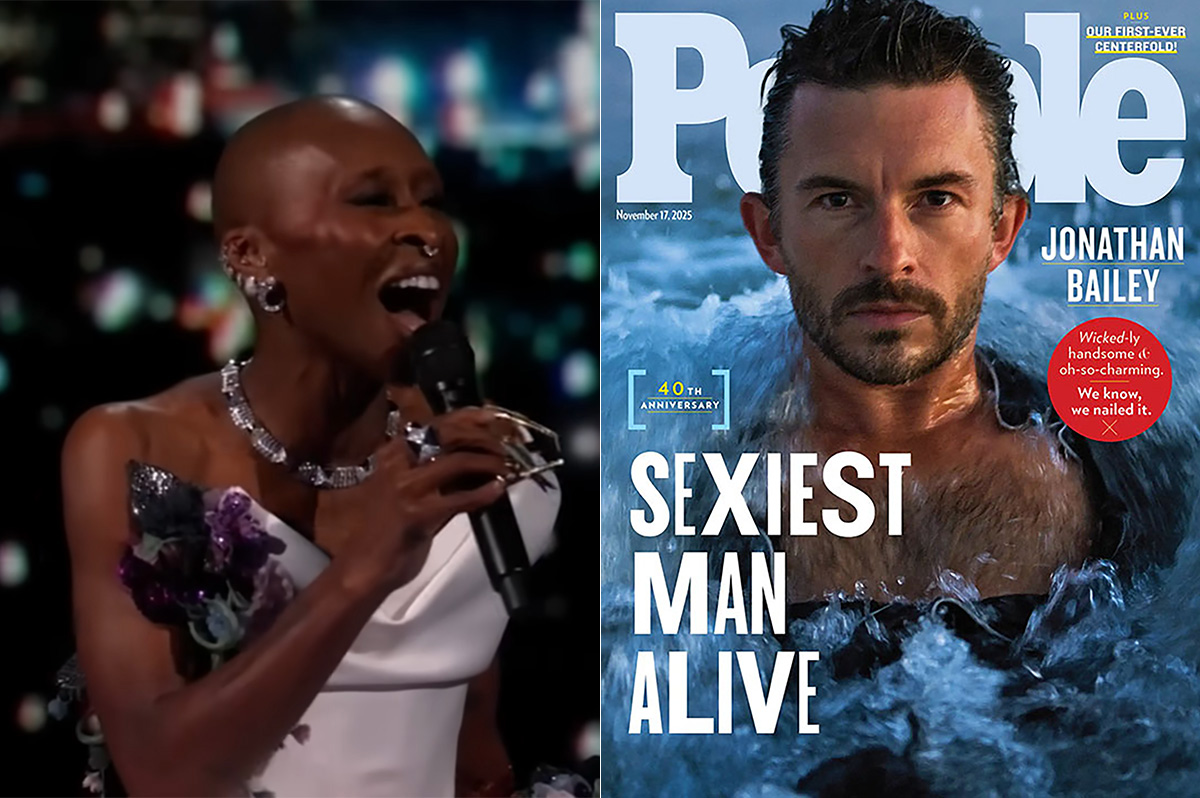
Although 2025 was a year marked by countless attacks on trans rights and political setbacks, the year also saw brilliant queer artists continuing to create art. From Cannes and Sundance Award winners now vying for Oscar consideration to pop icons entering new stages of their careers, queer people persevered to tell their stories through different media.
With the state of the world so uncertain, perhaps there’s no more vital time to celebrate our wins, as seen through some of this year’s top pop culture moments. While there’s no collection of 10 stories that fully encompass “the most important” news, here are some events that got the gays going:
10. ‘Mysterious Gaze of the Flamingo’ wins big at Cannes
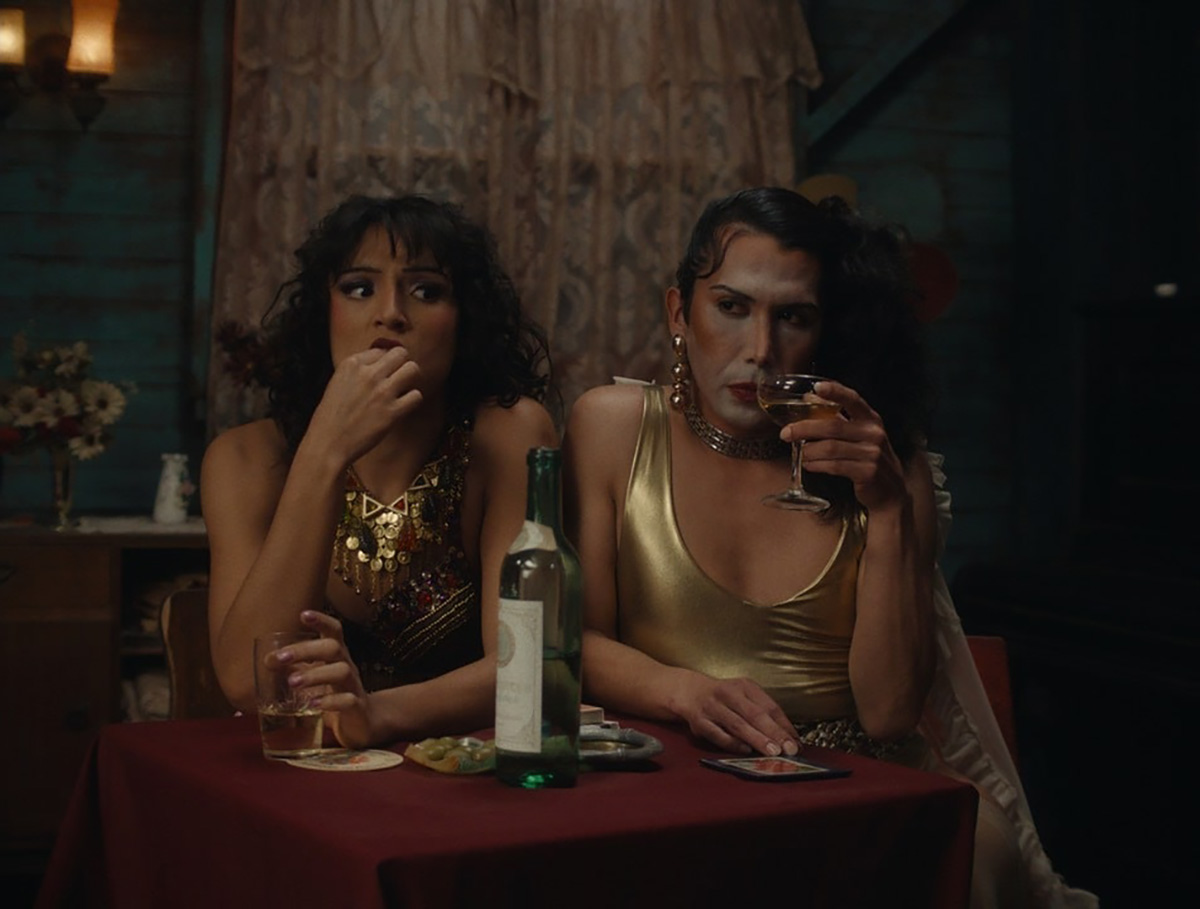
The Cannes Film Festival has become a crucial start for films hoping to make their way to the Oscars, and first-time director Diego Céspedes won the top Un Certain Regard prize for his intimate western “The Mysterious Gaze of the Flamingo.” The film is set in the ‘80s and is intended as an allegory for the AIDS epidemic. Seeing a film that unpacks vital queer history win one of the most coveted awards at Cannes has been a huge point of pride in the independent filmmaking community.
Since the film bowed at Cannes, it has been selected as Chile’s Oscar entry in the Best International Feature race. Speaking with The Blade during the film’s AFI Fest run in October, Céspedes said: At first, I was kind of scared to have this campaign position in the times that we’re living [in] here. But at the same time, I think the Oscars mean a huge platform — a huge platform for art and politics.”
9. ‘The Last of Us’ returns for an even gayer season 2
While the first season of The Last of Us gave us one of TV’s most heartbreaking queer love stories in the episode “Long, Long Time,” Season 2 doubled down on its commitment to queer storytelling with the blossoming relationship between Ellie (Bella Ramsey) and Dina (Isabela Merced). The show expanded on the pair’s relationship in the original video game, making it perhaps the central dynamic to the entire season. That unfortunately came with more homophobic backlash on the internet, but those who checked out all the episodes saw a tender relationship form amid the show’s post-apocalyptic, often violent backdrop. For their performance, Ramsey was once again nominated for an Emmy, but Merced deserved just as much awards attention.
8. ‘Emilia Pérez’ sparks controversy
Jacques Audiard’s genre-bending trans musical “Emilia Pérez” proved to be an awards season juggernaut this time last year, winning the Golden Globe for Best Musical/Comedy. But when the lead star Karla Sofia Gascón’s racist, sexist, and homophobic old tweets resurfaced, the film’s Oscar campaign became a tough sell, especially after Netflix had tried so hard to sell Emilia Pérez as the “progressive” film to vote for. Mind you, the film had already received significant backlash from LGBTQ+ audiences and the Mexican community for its stereotypical and reductive portrayals, but the Gascón controversy made what was originally just social media backlash impossible to ignore. The only person who seemed to come out of the whole debacle unscathed was Zoe Saldaña, who won the Oscar for Best Supporting Actress over Ariana Grande.
7. ‘Sorry, Baby’ establishes Eva Victor as major talent
Back in January at the Sundance Film Festival, Eva Victor (known by many for her brand of sketch comedy) premiered their directorial debut “Sorry, Baby” to rave reviews, even winning the Waldo Salt Screening Award. Victor shadowed Jane Schoenbrun on the set of “I Saw the TV Glow,” and seeing Victor come into their own and establish such a strong voice immediately made them one of independent cinema’s most exciting new voices. A memorable scene in the film sees the main character, Agnes (played by Victor), struggling to check a box for male or female, just one example of how naturally queerness is woven into the fabric of the story.
Most recently, Victor was nominated for a Golden Globe for her performance in the film, and she’s represented in a category alongside Jennifer Lawrence (“Die My Love”), Jessie Buckley (“Hamnet”), Julia Roberts (“After the Hunt”), Renate Reinsve (“Sentimental Value”) and Tessa Thompson (“Hedda”). The film also received four Independent Spirit Award nominations overall.
6. Paul Reubens comes out in posthumous doc
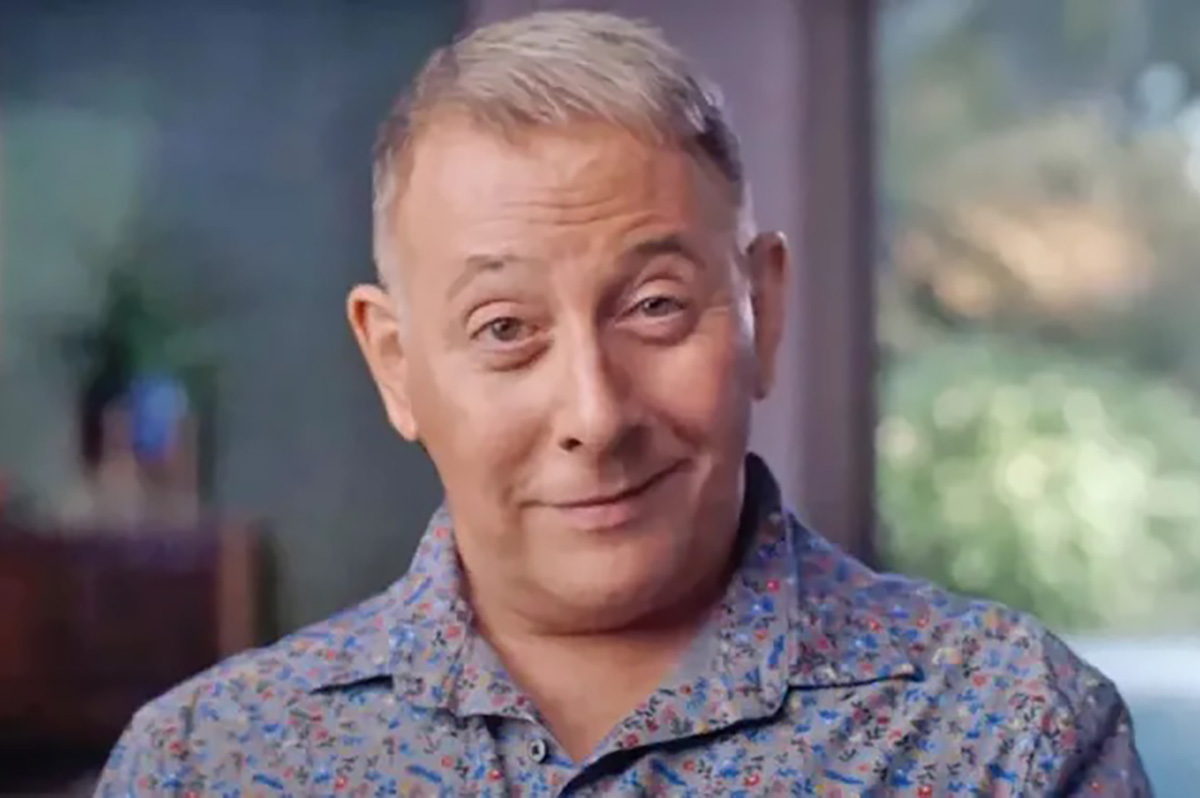
While Paul Reubens never publicly came out as gay before passing away in 2023, the two-part documentary “Pee-wee as Himself” premiered back in May on HBO Max, giving the legendary comedian a chance to posthumously open up to the world. Directed by Matt Wolf, the documentary explores how Reubens found his alter ego Pee-Wee Herman and why he kept his private life private.
The documentary won an Emmy in the Outstanding Documentary or Nonfiction Special category and remains one of the most critically acclaimed titles of the year with a 100% Rotten Tomatoes score. Also worth noting, the National Geographic documentary Sally told the posthumous coming out story of Sally Ride through the help of her long-time partner, Tam O’Shaughnessy.
5. Lady Gaga releases ‘Mayhem’
Lady Gaga entered a new phase of her musical career with the release of Mayhem, her seventh album to date. From the frenzy-inducing pop hit Abracadabra to the memorable Bruno Mars duet featured on “Die With a Smile,” seeing Gaga return to her roots and make an album for the most die-hard of fans was especially rewarding after the underwhelming film releases of “House of Gucci” and “Joker: Folie à Deux.” Gaga has been touring with The Mayhem Ball since July, her first arena tour since 2018. She even extended her tour into 2026 with more North American dates, so the party isn’t stopping anytime soon. And Gaga is even set to make an appearance next May in “The Devil Wears Prada 2.”
4. Cynthia Erivo, Ariana Grande perform at the Oscars
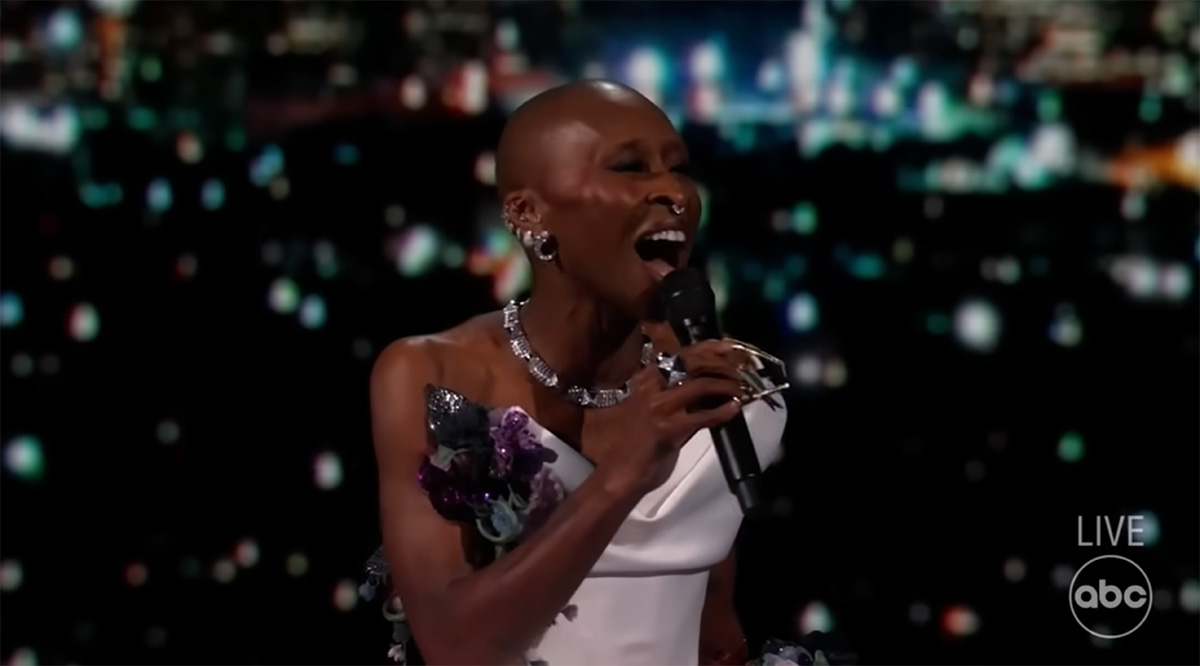
While “Wicked: For Good” didn’t quite reach the heights of the first film, we will forever have Cynthia Erivo and Ariana Grande’s breathtaking live performance that opened the 97th Academy Awards. The pair sang a rendition of “Over the Rainbow,” “Home,” and “Defying Gravity,” paying proper homage to the original 1939 “Wizard of Oz.” Even non-Wicked fans can’t deny how magical and brilliantly staged this performance was. With both Erivo and Grande up for acting Oscars last year, they’re hoping to repeat success and make history with consecutive nominations. Either way, let’s hope there’s another live performance in the making, especially with two new original songs (The Girl in the Bubble and No Place Like Home) in the mix.
3. Indya Moore speaks out against Ryan Murphy
Indya Moore has consistently used social media as a platform for activism, and in September, posted a 30-minute Instagram live speaking out against “Pose” co-creator Ryan Murphy. Moore claimed that Murphy wasn’t being a true activist for trans people. “Ryan Murphy, we need you to do more. You need to address the racism, the violence, and the targeting of people on your productions, Ryan Murphy. You do need to make sure trans people are paid equally. Yes, Janet did the right thing,” Moore said. Murphy was also back in the headlines this year for the critically panned “All’s Fair” and the controversial “Monster: The Ed Gein Story” starring Laurie Metcalf and Charlie Hunnam.
2. Cole Escola wins Tony for Best Leading Actor
Few pop culture moments this year brought us together more than Cole Escola winning a Tony award for “Oh, Mary!” the Broadway show they created, wrote and starred in (we love a triple threat!) Escola made history by becoming the first nonbinary person to win a Tony in the leading actor category, and seeing them excitedly rush to the stage wearing a Bernadette Peters-inspired gown instantly became a viral social media moment.
The cherry on top of Escola’s major moment is the recent news that they are writing a Miss Piggy movie with Jennifer Lawrence and Emma Stone producing — news that also broke the internet for the better. We cannot wait!
1. Jonathan Bailey makes gay history as ‘Sexiest Man Alive’
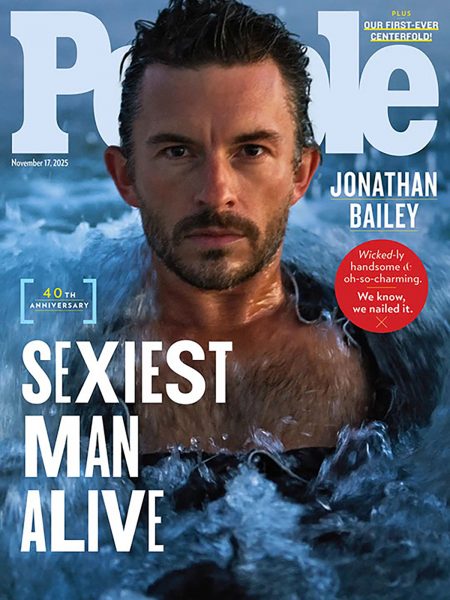
The same year as his on-screen roles in blockbusters “Jurassic World Rebirth” and “Wicked: For Good,” Jonathan Bailey made history as the first openly gay man to be named People magazine’s “Sexiest Man Alive.” The fact that it took 40 years for an openly gay man to earn the title is a signifier of how far we still have to go with queer representation, and seeing Bailey celebrated is just one small step in the right direction.
“There’s so many people that want to do brilliant stuff who feel like they can’t,” he told PEOPLE, “and I know the LGBT sector is under immense threat at the moment. So it’s been amazing to meet people who have the expertise and see potential that I could have only dreamed of.” In 2024, Bailey founded the charity titled The Shameless Fund, which raises money for LGBTQ+ organizations.
-

 U.S. Supreme Court4 days ago
U.S. Supreme Court4 days agoSupreme Court hears arguments in two critical cases on trans sports bans
-

 Virginia5 days ago
Virginia5 days agoWoman arrested for anti-gay assault at Alexandria supermarket
-

 District of Columbia4 days ago
District of Columbia4 days agoRuby Corado sentenced to 33 months in prison
-

 Commentary5 days ago
Commentary5 days agoHonoring 50 queer, trans women with inaugural ‘Carrying Change’ awards

